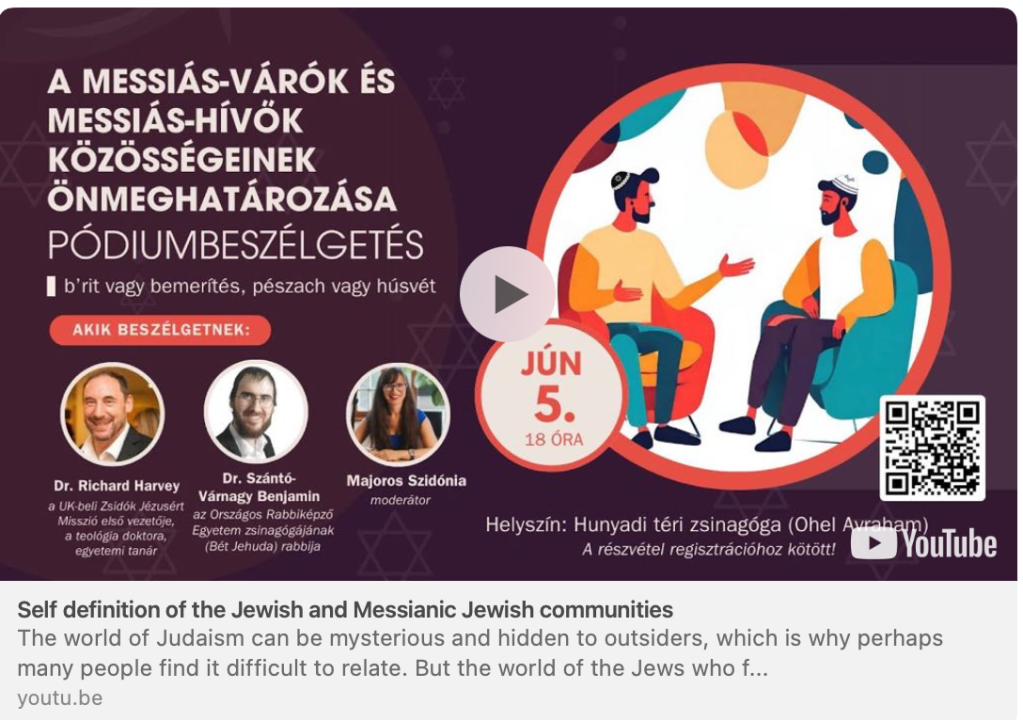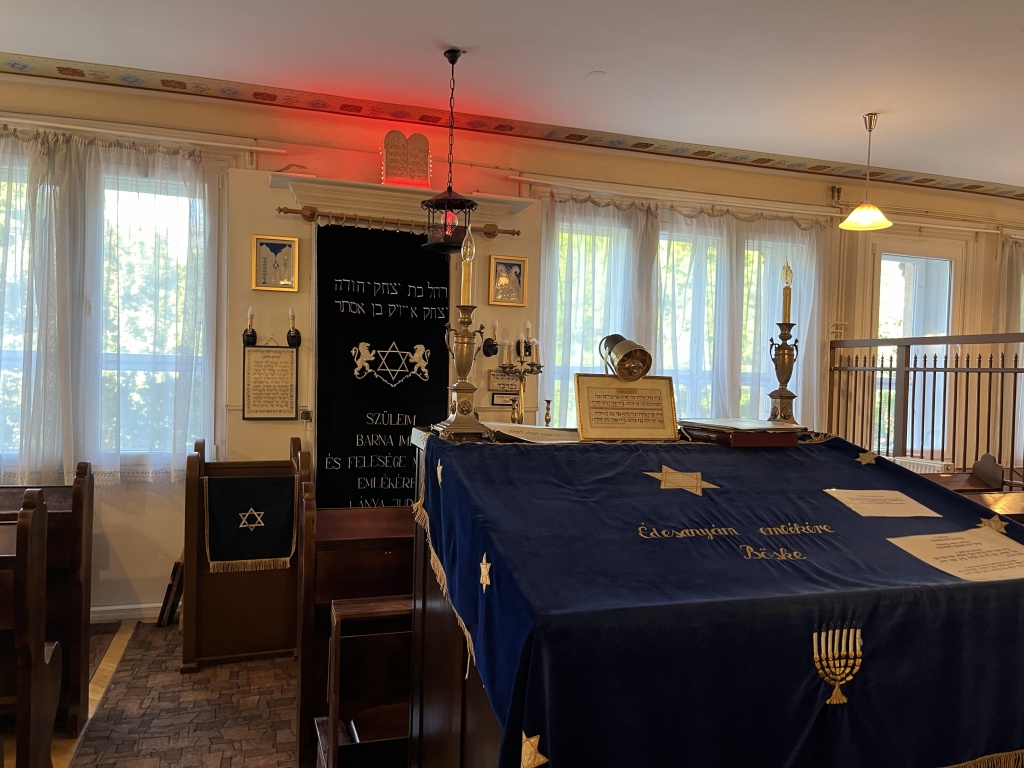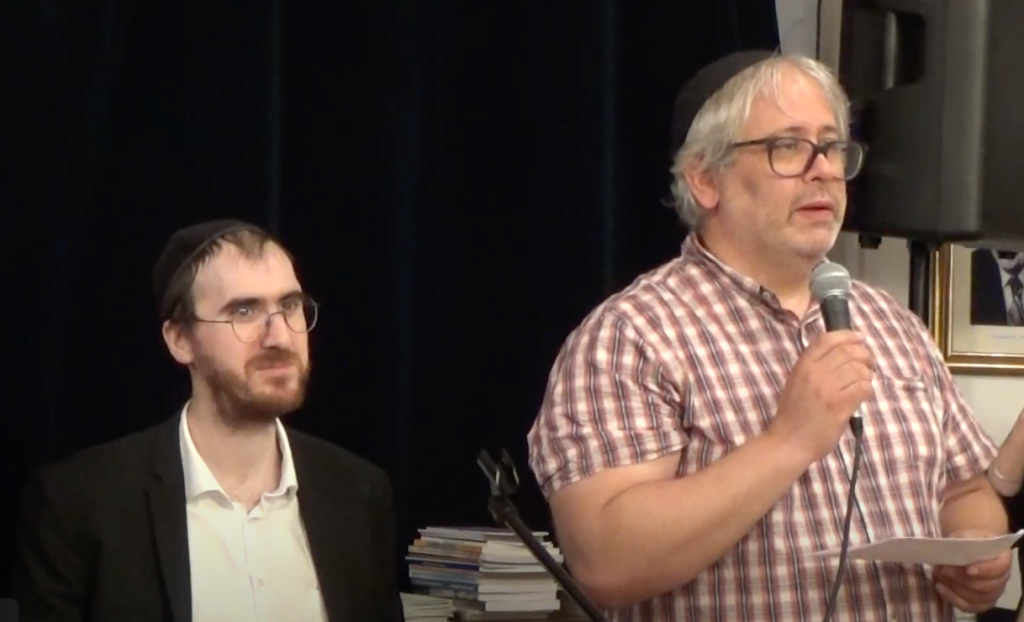Dialogue between Rabbi Binjomin Szántó-Várnagy and Dr. Richard Harvey

https://youtu.be/rcqBJ8gggFY
The dialogue between Rabbi Binjomin Szántó-Várnagyand Dr. Richard Harvey, held at the Ohel Abraham Synagogue in Budapest, represents a significant moment in Jewish-Christian relations, particularly between traditional Jews and Messianic Jews. The discussion was facilitated by Szidonia Majoros and hosted by Rabbi Gabor Finali. It addressed complex theological and cultural issues, exploring the nature of Jewish and Messianic Jewish identities, the interpretation of scriptures, and the historical context of their beliefs. This report evaluates the key arguments presented by both speakers, the tone and personal interaction expressed throughout the dialogue, and the overall value of the discussion in fostering mutual understanding and respect.
Ohel Abraham Synagogue, Budapest

Rabbi Binjomin emphasized the importance of traditional Jewish beliefs and practices, grounded in the Torah and historical continuity. His central argument revolved around the concept that Jewish identity is intrinsically linked to Torah observance. As Rabbi Santo stated, “For me, the demarcation line is whether someone says that for me this is obligatory. This is Orthodox: for me, whatever Hashem says in His Torah is obligatory. I am obligated to do this.” This underscores the belief that observing the Torah is not merely a choice but a divine commandment that defines Jewish life.

Rabbi Binjomin Szántó-Várnagy
Moreover, Rabbi Binyomin highlighted the fundamental Jewish belief in monotheism, emphasizing the strict oneness of God. He expressed concern about the Christian concept of the Trinity, which he views as conflicting with Jewish monotheism. “When we learn about Christian theology and its extraordinary understanding of being one… it is very unusual for simple Jews that it’s not really one, it’s maybe two or even three but it’s the one,” he argued. This theological boundary, he contended, creates a clear division between traditional Judaism and Messianic Judaism.
In addition to theological differences, Rabbi Binjomin discussed the cultural and historical aspects of Jewish identity, particularly focusing on the unique traditions of Hungarian Jews. “For me, it means that it’s not by coincidence. I don’t believe in coincidence. There must be some reason to it,” he said, emphasizing the importance of preserving Jewish heritage and community cohesion. He stressed that Jewish identity is shaped by a combination of religious obligation and cultural heritage.

Dr. Richard Harvey, representing the Messianic Jewish viewpoint, provided a counterbalance to Rabbi Binyomin’s arguments by emphasizing the integration of Jewish and Christian beliefs. He argued that belief in Yeshua (Jesus) as the Messiah does not negate Jewish identity but fulfils Jewish prophecies and traditions. “We discovered that Yeshua is the fulfillment of the promise to Abraham because in him all nations will be blessed,” Dr. Harvey stated, presenting Messianic Judaism as a continuation rather than a departure from Jewish faith.
Dr. Harvey highlighted the inclusive nature of Messianic Judaism, which seeks to bridge the gap between Jewish and Christian identities. He remarked, “I don’t see any contradiction between being Jewish and believing in Yeshua. What could be more Jewish than believing in the Jewish Messiah?” This inclusive approach is particularly relevant in the modern context, where identity is often multifaceted and fluid. Dr. Harvey’s position appeals to those seeking a spiritual path that integrates different traditions.
Furthermore, Dr. Harvey emphasized the ethical teachings of Yeshua and their relevance to contemporary Jewish life. “For me, Yeshua is Torah incarnate, and his interpretation of Torah is authoritative,” he said. He argued that the values taught by Yeshua align with core Jewish principles and can enhance the ethical and cultural practices of the Jewish community. This perspective suggests that Messianic Judaism can contribute positively to Jewish ethical and cultural life.

Rabbi Gabor Finali gives concluding remarks on the importance of such meetings
The overall sentiment expressed by both participants was predominantly positive. Rabbi Binjomin’s opening remarks were welcoming and informative, setting a respectful tone for the discussion. “Shalom, good evening, and a warm welcome to the Ohel Abraham Synagogue in Budapest, Hungary,” he began, establishing an atmosphere of mutual respect. Throughout the discussion, Rabbi Binyomin’s tone remained firm and explanatory, particularly when discussing the importance of traditional beliefs. His analytical and defensive approach was evident when addressing theological differences, as he sought strong evidence to support any new theological claims. “You mentioned the need for strong proof to substantiate strong claims… What is the need to introduce new elements?” he asked, reflecting his careful consideration of theological innovations.
Similarly, Dr. Richard Harvey’s sentiment was helpful and constructive. His opening remarks were engaging and warm, demonstrating enthusiasm and openness. “Shalom everybody, I hope you can hear me okay… I will start on time and finish on time,” he began, immediately engaging the audience with his approachable demeanor. Dr. Harvey’s inclusive and explanatory tone was evident in his discussion of Messianic Judaism, where he passionately advocated for the integration of Jewish and Christian beliefs. “We live as Jews and as Disciples of Rabbi Jesus and we keep the Jewish festivals,” he said, emphasizing the continuity of Jewish traditions within Messianic Judaism.
Dr. Harvey’s reflective and assertive tone was clear during his theological explanations. He confidently stated, “For me, Yeshua is Torah incarnate, and his interpretation of Torah is authoritative,” underscoring his belief in the compatibility of Yeshua’s teachings with Jewish principles. His responses to Rabbi Binyomin were respectful and clarifying, showing understanding and a conciliatory approach. “Thank you for clarifying clearly what some of the boundaries are,” he said, acknowledging Rabbi Binyomin’s points while offering his own perspective.
Value of the Dialogue

The dialogue holds significant value for several reasons. Firstly, it represents a continuation of the modern trend toward reconciliation and mutual respect between Jews and Christians. This discussion acknowledges the painful history of Jewish-Christian relations while seeking common ground and understanding. Such dialogues are essential for healing historical wounds and building a foundation for future cooperation.
Secondly, Dr. Harvey’s approach highlights the inclusivity of Messianic Judaism, which seeks to bridge Jewish and Christian identities. This resonates with individuals who find themselves straddling both worlds and promotes a more nuanced understanding of Jewish identity. “We are in the process of constructing our identity,” Dr. Harvey explained, reflecting the dynamic nature of identity formation in contemporary society.
Thirdly, the respectful tone of the dialogue contrasts sharply with the often coercive and hostile nature of historical disputations. Both speakers demonstrated a willingness to listen and engage thoughtfully with each other’s perspectives, fostering a more constructive and empathetic dialogue. This respectful approach is crucial for addressing complex theological and cultural issues without escalating tensions.
The dialogue also explores challenging theological issues, such as the nature of the Messiah, Torah observance, and scriptural interpretation. This depth is crucial for advancing understanding and addressing longstanding theological differences. By exploring these issues in detail, the discussion provides valuable insights for both communities. “We have to make our assumptions explicit,” Dr. Harvey noted, emphasizing the importance of clarity in theological discussions.
Additionally, the emphasis on cultural identity, ethical teachings, and community engagement is particularly significant in the context of secular and modern religious identities. Both speakers addressed how their beliefs shape their daily lives and ethical practices, making the discussion relevant to contemporary audiences. Rabbi Szántó-Várnagy highlighted the importance of direct connection to God through prayer, while Dr. Harvey emphasized the ethical teachings of Yeshua.
Finally, the educational value of this discussion cannot be overstated. For the audience, it serves as an opportunity to learn about both traditional Jewish and Messianic Jewish beliefs. It provides a platform for individuals to reflect on their own faith and identity, fostering a deeper understanding of the complexities within the Jewish community. “This dialogue is highly valuable for fostering mutual understanding and respect,” Rabbi Szántó-Várnagy concluded, underscoring the educational benefits of such discussions.
Reflection and Prayer
The dialogue between Rabbi Benyamin Szántó-Várnagy and Dr. Richard Harvey is a significant contribution to the ongoing history of Jewish-Christian relations. It exemplifies a respectful and meaningful exchange that acknowledges past grievances while looking toward a future of mutual understanding and respect. This discussion is a valuable step in the continuing journey of reconciliation and dialogue between these two faith communities, highlighting the potential for shared values and cooperative engagement.
“O God of justice and of mercy, help us open our hearts to those we have wronged, and beg their forgiveness; help us to reconcile with those who have wronged us and seek our pardon; and forgive our sins, beyond justice, in Thy great mercy. Amen” (Rosh Hashanah Morning Service)

